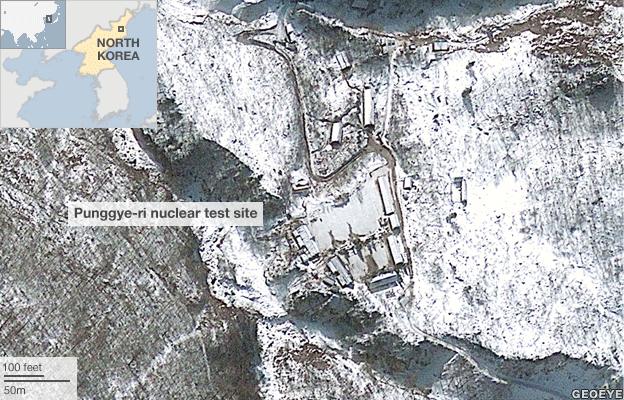Obama: Nuclear test 'isolates North Korea further'
- Published
President Obama: 'We will lead the world in taking firm action in response to these threats'
North Korea's actions will only isolate it further, US President Barack Obama has warned, hours after the UN Security Council unanimously condemned Pyongyang's nuclear test.
The US would lead "firm action" to counter the threat, the US president said in his State of the Union address.
The Security Council hours earlier called the test a clear threat to international security.
Monitors said the test appeared twice as big as the previous one in 2009.
The test took place at the Punggye-ri site in the north-east of the country on Tuesday morning.
A powerful underground explosion was detected at 11:57 (02:57 GMT), followed three hours later by confirmation from North Korea that a test had taken place.
State-run KCNA news agency said the test was "carried out at a high level in a safe and perfect manner using a miniaturised and lighter nuclear device with greater explosive force than previously".
North Korea said it was a response to the "reckless hostility of the United States".
Nuclear test monitors in Vienna say the underground explosion had double the force of the last test, in 2009, despite the use of a device said by the North to be smaller.
If a smaller device was indeed tested, analysts said this could take Pyongyang closer to building a warhead small enough to arm a missile.
South Korea is using aircraft and ships to collect air samples to analyse for increased radiation - which could give an indication of details about Tuesday's blast, the Associated Press news agency reported.
North Korea's two previous tests involved plutonium devices, but it is also believed to have a highly enriched uranium programme.
'Serious threat'
Speaking in Washington, Mr Obama said North Korea would only achieve security by meeting its international obligations.
"Provocations of the sort we saw last night will only isolate them further as we stand by our allies, strengthen our own missile defence and lead the world in taking firm action in response to these threats," he said.
Earlier the Security Council met in an emergency session at which members unanimously backed a statement calling the North in "grave violation" of UN resolutions.
"In line with this commitment and the gravity of this violation, the members of the Security Council will begin work immediately on appropriate measures in a Security Council resolution,'' the council said.
Mr Obama and outgoing South Korea President Lee Myung-bak also held telephone talks, as did Mr Lee and Japanese Prime Minister Shinzo Abe.
China - which backed the UN condemnation - summoned North Korea's ambassador in Beijing to express "firm opposition" to the test, the foreign ministry said.
"(Foreign Minister) Yang Jiechi demanded that the Democratic People's Republic of Korea (North Korea) side cease talk that further escalates the situation and swiftly return to the correct channel of dialogue and negotiation,'' a statement said.
But in a statement issued late on Tuesday, North Korea appeared far from cowed, promising "second and third tougher measures" if the US did not "admit its mistake and correct it".
The BBC's Barbara Plett, at the UN, says that so far isolation and pressure have been met by continued North Korean provocations. There is no sign that another round of sanctions will break that pattern.
Analysts say that is because Pyongyang seems ready to push harder than the Security Council is able to push back.
North Korea's open defiance of the UN suggests that it sees its nuclear weapons programme as a strategic asset that it will not give up, our correspondent adds.
This test - the first under new leader Kim Jong-un - was North Korea's third.
It came weeks after Pyongyang successfully used a rocket to put a satellite into space, a move condemned by the UN as a banned test of missile technology.
